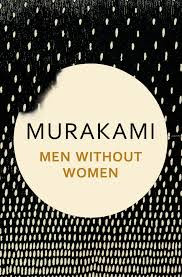 According to Amazon.com, the English version of Haruki Murakami's newest short story collection, Men Without Women, is to come out tomorrow, May 9. Reviews are already beginning to appear. Here is a link to a review from the Washington Post by Heller McAlpin, which came out on May 5. Of all the stories, McAlpin liked "Drive My Car" and "Yesterday" most. The review ends with this statement: "As the members of Murakami’s lonely hearts club band discover in these affecting stories, life, however baffling, is better shared."
According to Amazon.com, the English version of Haruki Murakami's newest short story collection, Men Without Women, is to come out tomorrow, May 9. Reviews are already beginning to appear. Here is a link to a review from the Washington Post by Heller McAlpin, which came out on May 5. Of all the stories, McAlpin liked "Drive My Car" and "Yesterday" most. The review ends with this statement: "As the members of Murakami’s lonely hearts club band discover in these affecting stories, life, however baffling, is better shared."
As is common with reviews of foreign literature, the reviewer does not comment on the quality of the translation. Also, although I believe the book has two translators, Phil Gabriel and Ted Goossen, only Gabriel is mentioned. Not nice...

Another review, by Arifa Akbar, appeared in the Financial Times also on May 5. Here is a link, but you may not be able to see the article without subscribing. This one reviews the British edition, and is titled "Men Without Women by Haruki Murakami -- island life." It talks about the "unbridgeable gap between the sexes" and quotes one of the stories in which the main character says, “I’m not stranded on a desert island . . . I am a desert island.”

A fitting illustration by Becky Strange.
The Guardian review (also from May 5th) was written by M. John Harrison and refers to "a quiet panic" in its title. The author looks for echoes of Hemingway, which the title of the collection, of course, suggests. You can read the review here. Harrison assures that "devotees will find plenty of signature Murakami here. Incidentally, this review doesn't even mention the translators.
Another review appeared in the Chicago Tribune on May 8, available here. The author, Shoshana Olidorf, seems to like only one of the stories, "Scheherazade," and is critical of the motif of "glorified male lust" present throughout the collection. When talking about "Samsa in Love," some aspects of which she likes, she says: "What follows is yet another iteration of a motif that undermines this entire collection, one in which unrestrained male lust is glorified under the guise of existential loneliness and female characters serve as mere vehicles for the fulfillment or denial of male longing." No mention of the translator in this review, either.
This also seems like a good opportunity to announce the French translation of the collection by Hélène Morita. It came out from Editions Belfond, Murakami's French publisher, in March of this year.
